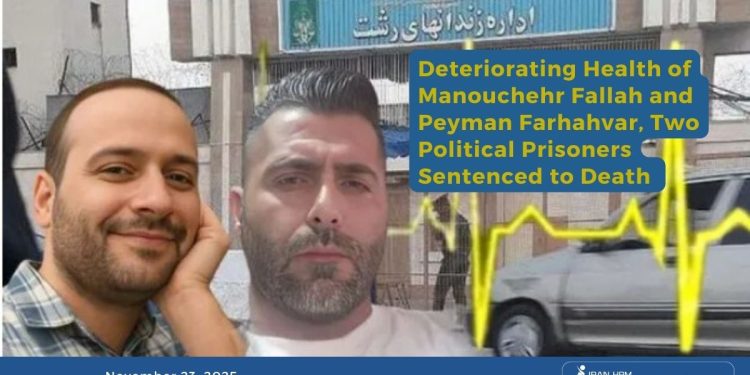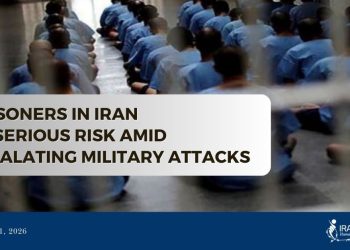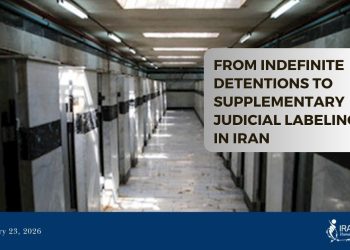Recent reports from Lakan Prison in Rasht indicate that the health condition of two political prisoners sentenced to death, Manouchehr Fallah and Peyman Farhahvar, has severely deteriorated, placing both at immediate risk of death. Held in the closed and dark “Misagh” ward, they suffer from the growth of numerous unidentified masses, severe pain, internal inflammation, and significant weight loss, while prison authorities and security agencies prevent their transfer to specialized medical facilities.
This situation reflects a deep-rooted and systematic pattern of medical deprivation targeting political prisoners across Iran—an approach that deliberately endangers their health and lives.
Critical Physical Condition: Growth of Masses, Infections, and Severe Weight Loss
According to reliable information, both prisoners have developed more than twenty unidentified masses in their bodies, some as large as a walnut. Due to being unable to eat prison food, Peyman Farhahvar has lost more than 15 kilograms and suffers from acute physical weakness. Manouchehr Fallah is in similar condition, suffering from chronic pain, internal inflammation, and an urgent need for imaging, biopsy, and specialist medical examinations.
Despite repeated warnings from families and prisoners, no specialist assessments, medical tests, or hospital transfers have been conducted. The only response has been the provision of simple painkillers that do not correspond to the severity of their condition.
Deliberate Denial of Medical Care and the Role of Security Agencies
Reports confirm that preventing the transfer of these prisoners to medical centers is carried out under direct orders from the Ministry of Intelligence. Even in near-emergency conditions, Lakan Prison authorities reject medical requests. Former prisoners and independent sources describe this approach as part of an intimidation strategy aimed at pressuring political detainees.
The “Misagh” ward is a closed and deprived environment, lacking light, fresh air, and basic hygiene facilities. Prisoners are effectively kept in prolonged quasi-solitary confinement—conditions that alone can cause physical and psychological deterioration, and when combined with medical deprivation, significantly increase the risk of death.
Manouchehr Fallah: A Political Prisoner Facing Imminent Execution
Case Background and Unfair Trial Process
Manouchehr Fallah, 42, was arrested during the 2023 nationwide protests on 17 June 2023. Although bail was issued, security agencies prevented his temporary release. In his first case, he was sentenced to 22 months and 17 days in prison on charges of “insulting Khamenei and propaganda against the state.” This sentence ended in August 2024, but he was not released, and the Revolutionary Court of Rasht opened a second case charging him with “moharebeh.”
On 3 February 2025, Judge Mohammad-Ali Darvish-Goftar (son) issued his death sentence. The trial was held via videoconference and without access to a chosen lawyer.
Letter from Manouchehr Fallah to His Daughter
In a letter written on the sixteenth birthday of his daughter, Asal, he wrote:
“On the eve of your birthday, they informed me of my death sentence, perhaps to make me surrender. But the path I have chosen was learned from the suffering of the people… remaining silent in the face of injustice is an unforgivable sin.”
He previously undertook a 28‑day hunger strike protesting his unlawful continued detention. With his appeal rejected by the Supreme Court, his execution is now considered imminent.
Peyman Farhahvar: A Gilani Poet with a Death Sentence and Serious Illness
Arrest and Security Charges
Peyman Farhahvar, a 37‑year‑old poet and cultural activist from Gilan, was arrested in August 2024 and transferred to Lakan Prison after interrogation by the Intelligence Ministry. On 30 April 2025, he was sentenced to death by Judge Ahmad Darvish-Goftar—without the presence of a lawyer—on charges of “baghi” and “moharebeh.” The Supreme Court upheld the death sentence in September 2025.
The charges brought against him largely stem from his writings, social criticism, support for farmers, and objections to environmental destruction and widespread villa construction in Gilan.
Severe Illness and Medical Neglect
Farhahvar suffers from lymphatic infections, multiple abscesses, and tumor-like swellings following gallbladder removal surgery. A cellmate states:
“His whole body is infected… touching the masses causes severe pain… if they don’t help him, he will not survive.”
Despite his critical condition, he has only been taken to the prison infirmary without any specialist examination or proper imaging. He has a young child, and his family has been denied updates regarding his medical and legal situation for months.
International Evidence: Amnesty International Warning
Amnesty International, in its Urgent Action statement on the widespread execution crisis in Iran, explicitly listed the names of Manouchehr Fallah and Peyman (Amin) Farhahvar among prisoners at risk of execution, warning:
“Among those at risk of execution are individuals such as Manouchehr Fallah and Peyman (Amin) Farhahvar… thousands of people in Iran are at risk of execution—many convicted on vague charges after grossly unfair trials.”
This statement describes a “horrific execution crisis” in Iran and urges immediate action.
https://www.amnesty.org/en/wp-content/uploads/2025/09/MDE1302772025ENGLISH.pdf
Human Rights Analysis
These cases reflect serious violations of fundamental human rights principles:
- Article 3, UDHR: Right to life
- Article 5: Prohibition of torture
- Article 25: Right to medical care
- Article 10, ICCPR: Humane treatment of detainees
- Article 12, ICESCR: Right to health and medical access
The combination of solitary-like confinement, medical neglect, unfair trials, and imminent execution constitutes systematic violations of Iran’s international obligations and highlights the escalating humanitarian crisis in its prisons.
Conclusion
The worsening medical condition of Manouchehr Fallah and Peyman Farhahvar, combined with deliberate medical deprivation and imminent execution, places both prisoners at immediate and severe risk. Urgent intervention by international human rights bodies, UN mechanisms, and global civil society is required to prevent further tragedy.







